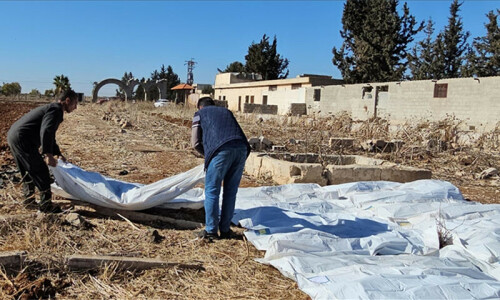LONDON The world is tantalisingly close to wiping out polio, but experts are starting to worry about the high risk of failure and say it could have consequences for confidence in health battles far beyond this crippling disease.
Global health and vaccines experts say they have polio “on the ropes”, but are frustrated that the goal of eradicating it continues to elude them more than 20 years after they set their sights on it. They fear failure could crush trust in other major disease projects such as fighting malaria, HIV or measles.
“The failure to eradicate polio so far means there is a smell of a suspicion about all vaccine initiatives,” said Professor David Salisbury, former chair of the World Health Organisation's Strategic Advisory Group of Experts (SAGE) on Immunisation. “That's why we must achieve polio eradication. We need to demonstrate that it can be done.” Salisbury and others point to the emergence of “donor fatigue” in global health projects and say the failure to wipe out polio risks making that worse.
Polio spreads in areas with poor sanitation, attacks the nervous system and can cause irreversible paralysis within hours of infection. Children under five are the most vulnerable to the virus - a disease that until the 1950s crippled thousands of people every year in rich nations. In 1988, when the WHO and its partners formed the Global Polio Eradication Initiative to lead the battle, polio was endemic in 125 countries and paralysed nearly 1,000 children every day. Now it is endemic in just four countries - India, Pakistan, Nigeria and Afghanistan - and there has been a 99 per cent reduction in cases since 1988.
“We have polio on the ropes, but with an eradication programme 99 per cent reduction is not good enough,” said Walt Orenstein, deputy director for vaccine-preventable diseases at the Bill & Melinda Gates Foundation, which has promised to put $10 billion into developing and delivering vaccines to those most at need over the next decade.
Globally, there have been 706 cases of polio this year, down from 1,126 at this point in 2009, but more than 570 of those have been in countries that had previously managed to banish it and are now fighting outbreaks re-seeded from endemic countries.
CREDIBILITY Joe Cerrell, head of the Gates Foundation's European office, said the knock-on effect of that could also stretch far wider.
“If after 20 years of being promised that we'll soon see polio eradicated, our credibility to be able to take on other great tasks will be severely damaged if we fail,” he said.
Global health advocacy groups say they are already coming up against reluctance from governments of wealthy donor nations - who have an ever keen eye on their electorates and the need for budget cuts - who want to channel aid into shorter-term goals that can become quick and demonstrable success stories.
“If the global health community is asking international donors to take on long term, but we think achievable, goals like malaria eradication or developing an HIV vaccine - things that may seem like moon shots to some - then the confidence of those donors will be really compromised by our record on polio,” said Cerrell. “That's the tangible risk.”
The WHO warned last month that re-seeded outbreaks of polio in Angola, a nation that had previously not seen any cases for seven years - are now becoming established and starting to pose a threat to neighbouring countries.
Experts are starting to worry about possible further spread throughout the region and about the high cost of conducting emergency response campaigns at a time when the global funding for polio is already at falling short.
According to the Global Polio Eradication Initiative, $2.6 billion is needed to fight polio for the 2010 to 2012 period and there is currently a funding gap of $810 million.
Recent large outbreaks in Tajikistan, which the WHO says has had 458 cases so far this year after having none in 2009, add further to the fear that a lack of vigilance will allow the virus to keeping popping up again, and that wiping out those last few cases may take many more years.
Sona Bari of the WHO describes polio eradication as “a litmus test” for future global health projects.
“It's not just about eradicating polio,” she said. “If we've got the best interventions in terms of vaccines, the best disease surveillance systems, the best technical assistance and the best people out there in the field working on eradicating polio - if we can't do that, how can we expect to do the other things?—Reuters












































Dear visitor, the comments section is undergoing an overhaul and will return soon.